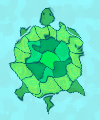>>Health
How to keep your pet slider healthy?
Like humans, they need proper care, nutrition, basking (sun-bathing) and a
clean environment to live in. Check out housing.
How do you know if it is sick?
You will have to check on your pet regularly as they can't tell you when they
are sick. Some ways to tell if they are sick is to see if their behaviour
changed, they become unactive or not alert. Poor appetite. Breathing difficulty,
inconstant rate of breathing. White spots on the shell. Diarrhea. Or swollen
eye.
Bringing it to the vet
Before you bring your turtle to any vet, please make sure that the vet is
knowledgeable in treating turtles and not any vet for cats and dogs. Improper
treatments may worsen turtles' condition.

Swollen eye:
The turtle will not open it's eyes all day and the eyes will look swollen,
may have poor appetite. Two of my res have experienced it and another one
died because it is very small and totally refuse to feed. If it's not serious,
it can be fully recovered if it is fed with food rich in vitamin A like carrots,
keep the water clean and use eye-drops (from pharmacy). This disease may take up to a month or so to heal. If condition turns serious, it may need a vitamin A injection or antibiotic from the vet.
Flu:
Have runny nose or breathing difficulties. Prevent exposure to wind. Keep
sick turtle away from other turtles. It is best to consult the vet if there's
no improvement after a week or less.
Soft shell:
When you pick it up, it's whole carapace is soft. (The edge of baby slider
is usually soft, but it is not soft shell disease). Give it longer basking
hours and improve nutrition. Give it food with calcium, some guppies can be
good because their bones have calcium but it can get messy when they feed.
Fungus infection:
White cotton-like stuff on it's shell. Put turtle in salt water for 30 min
a day.
If it is algae, you don't have to worry, just scrub it's shell with a soft
toothbrush occasionally. Usually baby res don't have algae growth, you can
start brushing its shell occasionally after it reaches 1 yr old.
Shell rot:
This is rare in homekept res. It could be due to parasite. So anti-fungal
medicine may help. I need to find out more about it.
Shell Repair:
How to treat a cracked shell? Refer to http://www.turtlecare.net/repair.htm
Peeling skin:
Usually due to dirty water. You will have to clean the water it swims in more
regularly and give it a bigger basking spot. Basking can help improve its
skin condition, but remember don't bake for too long. Peeling skin does not
mean peeling shell!
Wound:
Put it away from other turtles. Clean and medicate the wound with antiseptic.
If it is an open wound, put the turtle in a dry place at night and put it
back in water in the day. This is to quicken healing because the blood on
the wound can clot better and reduce infection. If wound is serious like fractured
bones or severe cut, bring it to the vet.
Diarrhea:
This may be due to eating too much fruit. Adjust its diet. If problem persists,
bring it to a vet. Maybe it has eaten something wrong or there's parasite
infection.
Constipation:
If your res did not pass motion for 3 days or more, it could be constipation.
This could be due to diet too high in protein or intestinal obstruction. The
turtle will keep kicking it's tail with it's hind legs and has no regular
bowel movements. Soak it in lukewarm water. And feed it with more variety
of food like fruits and vegetables.
Drowning:
Method in saving an unconscious turtle before it's too late. It may not be
dead yet. Refer to
http://www.turtlecare.net/drown.htm
*Some aquatic turtle's sickness can be cured by using medication for fish.
If there's no proper treatment for your turtle and it's condition is not improved, it may die. So remember to do a check up on your turtle regularly.



